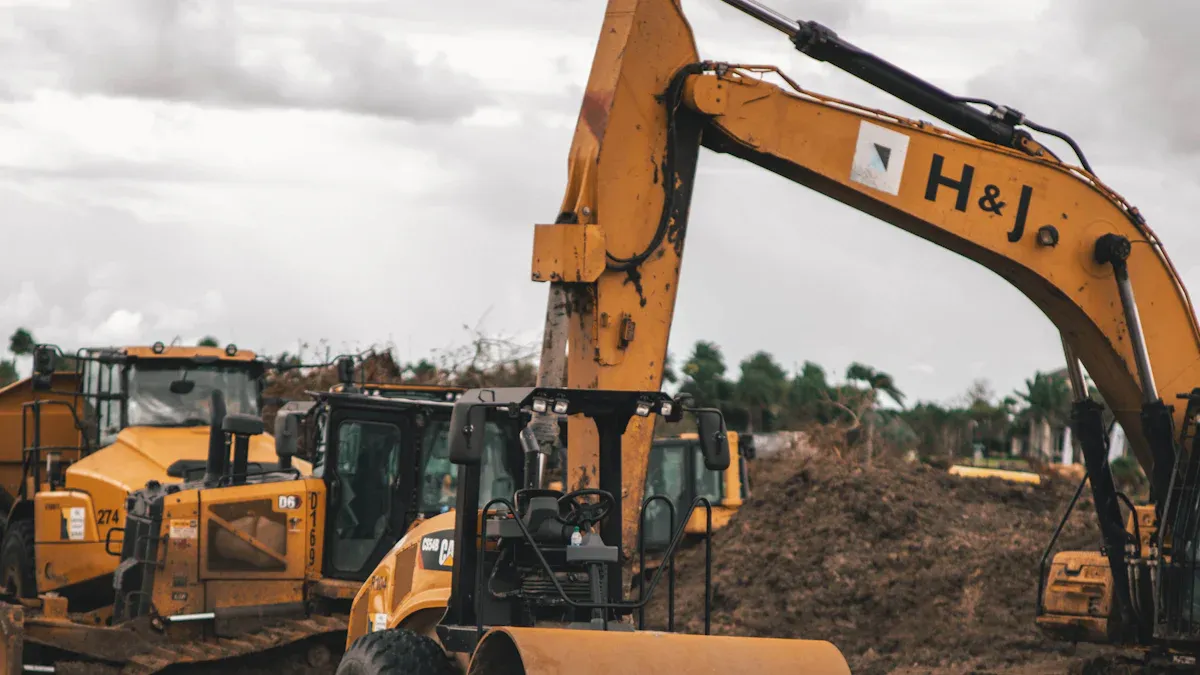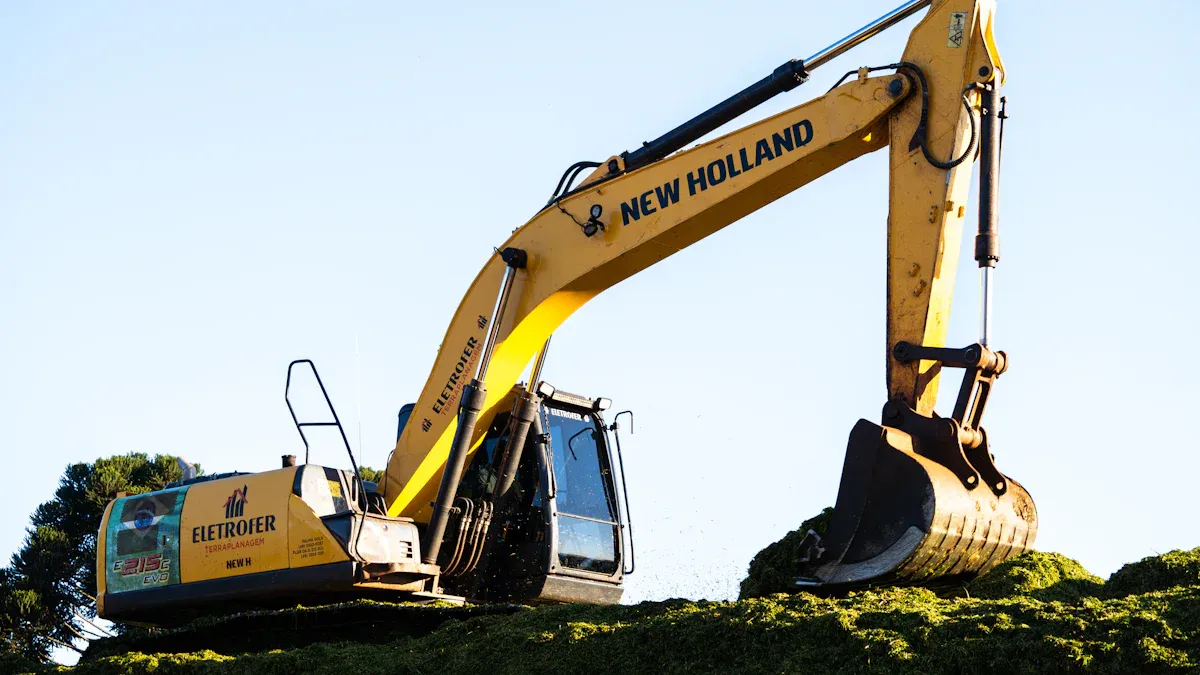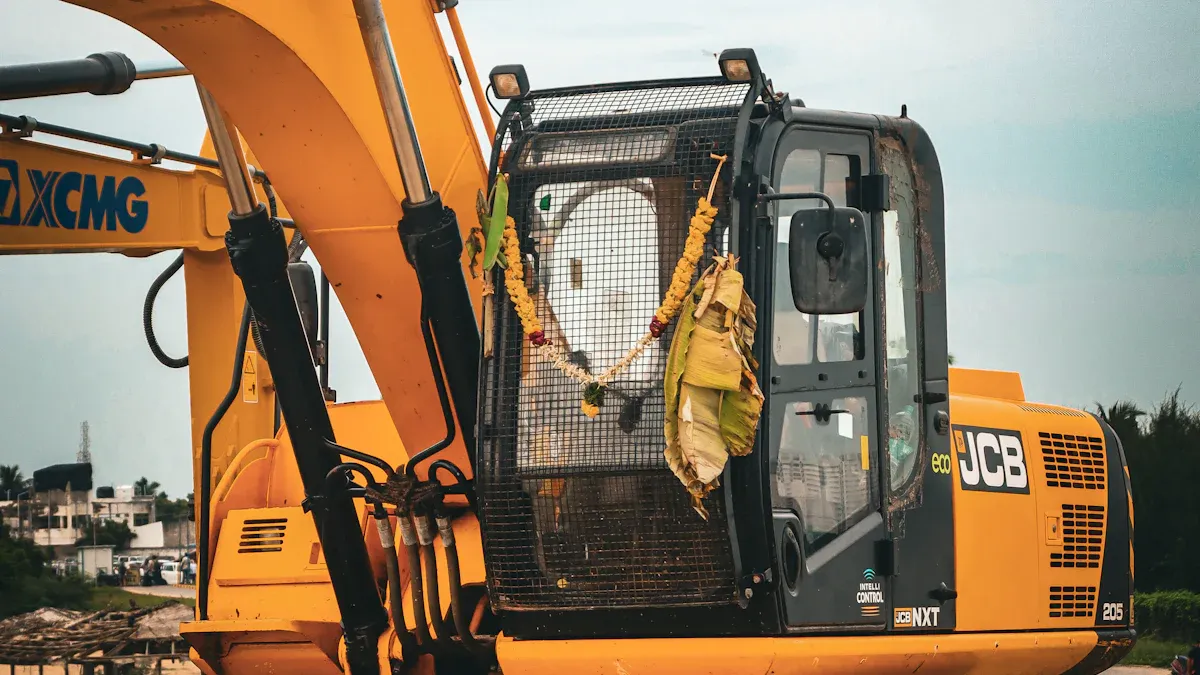
Precise UNI-Z series bucket teeth selection directly lowers large excavator maintenance expenses. Optimizing tooth choice offers immediate financial advantages for operational longevity. This approach protects the main bucket structure, preventing expensive damage and significantly reducing downtime. A strategic investment in the right UNI-Z bucket tooth system is crucial for long-term cost reduction. Choosing the correct UNI-Z replacement bucket teeth size 1 ensures efficient operation. As a leading UNI-Z excavator bucket tooth aftermarket supplier, we understand this impact. Explore solutions at UNI-Z bucket tooth systemhttps://www.nbjm-china.
Key Takeaways
- Choosing the right UNI-ZI teeth saves money on excavator repairs.
- Matching UNI-ZI teeth to the job makes excavators work better.
- Checking UNI-ZI teeth often helps them last longer.
- Good UNI-ZI teeth use less fuel and save time.
Understanding the UNI-Z Bucket Tooth System for Cost Savings

Key Features of UNI-ZI Series for Enhanced Durability
The UNI-ZI series teeth offer exceptional durability. Manufacturers design these teeth to withstand the harshest digging conditions. They incorporate advanced engineering principles, ensuring a longer lifespan for each tooth. This robust construction directly translates into fewer replacements. Operators experience less downtime and maintain consistent productivity. The UNI-ZI series provides a reliable solution for demanding large excavator operations.
Matching UNI-ZI Tooth Design to Excavator Application
Selecting the correct UNI-ZI tooth design for specific excavator applications is crucial for efficiency and cost savings. Different tasks demand different tooth profiles. For example, the UNI-ZII UNI-Z Standard Bucket Tooth Point Size 2 excels in lighter excavation tasks. This includes trenching, landscaping, or construction sites needing strong digging support in difficult terrain. Its high carbon steel construction provides excellent shock absorption. This makes it suitable for demanding job sites with extra heavy materials. It also features an anti-seize metal coating for corrosion protection. Customization options with optional teeth and adapters are available. Understanding the weight of each series also helps in selection:
| Brand | Part No. | KG |
|---|---|---|
| UNI-Z | UNI-ZI | 1.1 |
| UNI-Z | UNI-ZII | 1.7 |
| UNI-Z | UNI-ZIII | 3 |
Matching the tooth to the job optimizes performance and reduces wear.
Material Composition and Wear Resistance of UNI-ZI Teeth
The material composition of UNI-ZI teeth significantly impacts their wear resistance. Manufacturers use leading alloys in their production. These specialized alloys provide superior hardness and toughness. This combination resists abrasion and impact effectively. The advanced metallurgical properties ensure the teeth maintain their sharp profile longer. This reduces the frequency of tooth changes. Investing in the high-quality material of the UNI-Z bucket tooth system ultimately lowers operational costs.
Strategic UNI-ZI Selection to Minimize Downtime and Wear

Assessing Ground Conditions for Optimal UNI-ZI Tooth Choice
Selecting the correct UNI-ZI tooth type begins with a thorough assessment of ground conditions. Excavator teeth experience varying wear rates depending on the materials they excavate. For instance, highly abrasive sand causes rapid wear, while rocky or compacted soils present distinct challenges. Operators must consider the primary materials handled to select teeth optimized for wear life. For deep digging and trenching, sharp ‘V’ shaped teeth, such as Twin Tiger Teeth, offer excellent penetration in hard materials. However, these teeth often have shorter lifespans. Conversely, wider, flatter teeth prove better suited for loading and material handling applications.
To guide optimal selection, consider these recommendations for various applications:
| Application | Recommended Bucket Teeth | Features |
|---|---|---|
| General Digging (Soft to Medium Soil) | Standard Chisel Teeth | Balanced penetration & durability |
| Hard Soil, Clay & Gravel | Twin Tiger Teeth | Sharp for increased penetration |
| Rocky or Frozen Ground | Rock Teeth | Reinforced for high impact resistance |
| High Abrasion (Mining, Sand, Quarrying) | Abrasion-Resistant Teeth | Extra wear protection, self-sharpening |
Understanding the material composition and hardness of different tooth types also informs selection. For example:
| Feature | General Purpose | Heavy Duty | Penetration | Tiger | Long | Chisel |
|---|---|---|---|---|---|---|
| Material | Alloy Steel | Hardened Steel | Tungsten Carbide | Forged Steel | Alloy Steel | Abrasion Resistant steel |
| Rockwell Hard | 45-50 HRC | 50-55 HRC | 55-60 HRC | 52-58 HRC | 48-53HRC | 50-56 HRC |
| Impact Resist | Moderate | High | Very High | High | Moderate | High |
| Application | Soil, Sand | Clay, Gravel | Dense, Compact | Rocky, Boulders | Loose material | Hardpan, Frost |
| Self-Sharpen | No | Some | Yes | Yes | Some | Yes |
| Wear Life | Standard | Extended | Long | Long | Extended | Extended |
Soil analysis represents a critical first step in selecting excavator teeth. Understanding the ground’s PSI is essential. For example, clay might require teeth for 2,000 PSI, while rock could demand teeth capable of handling 20,000 PSI due to varying hardness. The required force can reach 5,000 pounds, suggesting a tooth hardness near 500 Brinell. Adjusting the digging angle, typically between 20 to 45 degrees, also enhances digging efficiency. Additionally, considering the ground’s weight (90-120 pounds) and checking compaction, including shear strength, are smart practices for optimal tooth selection. This careful consideration ensures the UNI-Z bucket tooth system performs at its best.
Impact of UNI-ZI Tooth Profile on Digging Efficiency
The specific profile of a UNI-ZI tooth significantly influences digging efficiency. A sharp, penetrating tooth profile, for instance, cuts through dense material with less resistance. This reduces the force required from the excavator, leading to lower fuel consumption and less strain on hydraulic components. Conversely, a blunter, wider tooth profile excels in loading loose material, maximizing bucket fill factors. Choosing the correct profile minimizes cycle times, allowing operators to move more material in less time. This direct correlation between tooth profile and operational output underscores the importance of informed selection.
Identifying Early Wear Indicators for Timely UNI-ZI Replacement
Proactive identification of wear indicators on UNI-ZI teeth prevents costly damage and maintains operational efficiency. Operators should regularly inspect teeth for signs of blunting, cracking, or excessive material loss. A blunted tooth loses its penetration capability, forcing the excavator to work harder and consume more fuel. Cracks can lead to tooth breakage, potentially damaging the adapter or even the bucket itself. Timely replacement of worn teeth prevents these secondary damages, which often incur much higher repair costs and extended downtime. Establishing a routine inspection schedule and replacing teeth at the first sign of significant wear ensures continuous productivity and protects the overall investment in the UNI-Z bucket tooth system.
Maximizing UNI-ZI Lifespan and Reducing Replacement Costs
Proper Installation Techniques for Extended UNI-ZI Use
Correct installation significantly extends UNI-ZI tooth life. Technicians must ensure a secure fit between the tooth and adapter. Improper seating causes premature wear and potential breakage. Always follow manufacturer guidelines for pin and retainer placement. A tight, stable connection prevents movement and reduces stress on the components. This careful attention during installation directly contributes to longer operational periods. It also protects the entire bucket structure from unnecessary strain.
Routine Inspection and Maintenance Practices for UNI-ZI Teeth
Regular inspections are vital for maximizing UNI-ZI tooth lifespan. Operators should visually check teeth daily for wear, cracks, or looseness. Early detection of issues allows for timely intervention. Replace worn teeth before they fail completely. This prevents damage to the adapter or bucket. Maintaining proper tooth sharpness also improves digging efficiency. A well-maintained set of UNI-ZI teeth performs better and lasts longer. This proactive approach saves significant repair costs.
The Cost-Benefit of Premium UNI-ZI Bucket Tooth System
Investing in a premium UNI-ZI bucket tooth system offers substantial long-term benefits. These high-quality teeth feature superior materials and advanced designs. They resist wear and impact more effectively than standard alternatives. While the initial cost might seem higher, their extended lifespan reduces frequent replacements. This minimizes downtime and labor expenses. The enhanced durability of a premium UNI-ZI bucket tooth system ensures consistent productivity. It ultimately delivers a much lower total cost of ownership.
Quantifying Maintenance Savings with Smart UNI-ZI Choices
Calculating ROI of Optimized UNI-ZI Tooth Selection
Businesses achieve significant financial returns by optimizing UNI-ZI tooth selection. Choosing the correct teeth for specific applications directly reduces replacement frequency. This minimizes material costs for new teeth and adapters. It also drastically cuts down on labor hours spent on changes. Furthermore, fewer replacements mean less excavator downtime. Each hour an excavator sits idle costs money. Therefore, smart UNI-ZI choices ensure machines stay operational, generating revenue. This strategic investment quickly pays for itself through these combined savings.
Reducing Fuel Consumption Through Efficient UNI-ZI Digging
Efficient UNI-ZI teeth directly contribute to lower fuel consumption. A sharp, correctly profiled tooth penetrates material with less resistance. This means the excavator’s engine works less strenuously to achieve the same digging power. Less engine strain translates into reduced fuel burn per hour. Over an excavator’s operational lifespan, these small, consistent fuel savings accumulate into substantial cost reductions. Operators notice the difference in their daily fuel logs. This efficiency directly impacts the bottom line.
Lowering Labor Costs for UNI-ZI Tooth Changes
Smart UNI-ZI choices significantly lower labor costs associated with tooth changes. Durable, application-matched teeth last longer. This reduces the frequency of tooth replacements. Fewer changes mean maintenance crews spend less time performing this task. This frees up valuable labor hours for other critical maintenance activities. Additionally, quicker, less frequent changes minimize the time an excavator is out of service. This maximizes productive working hours and further enhances overall operational efficiency.
Precise UNI-ZI series tooth selection directly reduces significant maintenance costs. This critical link ensures operational efficiency. Informed UNI-ZI choices offer substantial long-term financial advantages for any operation. They minimize downtime and maximize productivity. Businesses must adopt a proactive approach to UNI-Z bucket tooth system management. This strategy optimizes excavator fleet performance and ensures lasting profitability.
FAQ
What makes UNI-ZI series teeth so durable?
UNI-ZI series teeth feature advanced engineering principles. Manufacturers use leading alloys in their production. This specialized material composition provides superior hardness and toughness. It effectively resists abrasion and impact. This robust construction ensures a longer lifespan for each tooth.
How does matching UNI-ZI tooth design to the application save money?
Matching the UNI-ZI tooth design to the specific application optimizes performance. It reduces wear and tear. The correct tooth profile minimizes resistance, lowering fuel consumption. It also extends the tooth’s lifespan. This strategic selection directly translates into fewer replacements and less downtime.
What are the main benefits of investing in a premium UNI-ZI bucket tooth system?
Investing in a premium UNI-ZI system offers substantial long-term benefits. These high-quality teeth resist wear and impact more effectively. This reduces frequent replacements and minimizes downtime. The enhanced durability ensures consistent productivity. It ultimately delivers a much lower total cost of ownership.
How do UNI-ZI teeth reduce fuel consumption?
Efficient UNI-ZI teeth directly contribute to lower fuel consumption. A sharp, correctly profiled tooth penetrates material with less resistance. This means the excavator’s engine works less strenuously. Less engine strain translates into reduced fuel burn per hour.
Post time: Oct-27-2025